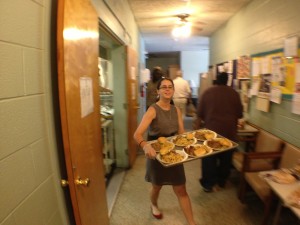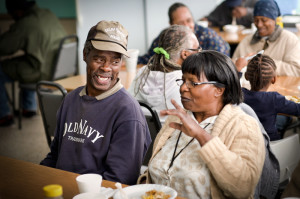The Story Behind Friendship Place
Friendship Place is a Christian organization that works to provide people with the opportunity overcome crises and work toward self-sufficiency. For more than 19 years, we have fed the hungry, provided job readiness training, and worked to creatively address the unmet needs of the Georgetown County Community.
Humble Beginnings
Our efforts began in 1998 when a group of concerned citizens gathered at St. Cyprian’s Outreach Center to discuss the unmet needs of Georgetown County. Over the course of several meetings, the group settled on hunger and homelessness as the major unmet needs in the area. By 1999, the group had evolved into a board of directors, and with the help of the Gaylord and Dorothy Donnelley Foundation, commissioned a study of the services available to the needy of the entire low-country of South Carolina. The study confirmed that there were very few services offered to the hungry and the homeless of Georgetown County.
In January of 2000, Friendship Place borrowed a small corner in an unused room at St. Cyprian’s Outreach Center and opened its doors. Our initial goals were to meet the unmet needs of the community, to not duplicate any services already available, and to listen to the needs and concerns of our clients. We have used this approach to design and implement the programs we currently offer.
Our first efforts involved establishing a year-round feeding program. The Sisters at St. Cyprian’s had already operated a hot-meal program one day a week, from January through March. We took over the program, and immediately expanded to two days a week. This effort provided the staff and volunteers an excellent tool to begin to impact the needs of the hungry and homeless, and simultaneously identify other needs of those in the community.
Over the years, we have expanded the hot-meal program to five days a week. We serve our meal Monday through Friday from 11 am to 12 pm to anyone that is hungry. We work hard to treat everyone that enters the dining room as a guest in our home. All that we ask in return is that all of our guests reciprocate. Each meal is started with a prayer, usually led by a guest. We also occasionally have community information or health-related classes presented by volunteers.
Volunteers
Local churches, youth groups, other organizations and nonprofits provide the volunteers that serve for each meal. The volunteers are the wait staff and serve each plate of food to the guests. There are no buffet lines at Friendship Place. Additional volunteer opportunities at Friendship Place include special projects like cleaning around our dining hall, kitchen, and setting up for the meal. Other opportunities may include helping out with fundraising events and our job training program. Please contact us if you are interested in any volunteer opportunities.
Meeting Needs
As we have listened to our clients, we have been forced to put aside our preconceived ideas of the problems they are facing. Using their input, we designed and implemented programs to meet their unique needs. In February of 2000, we assisted our first homeless individual. The gentleman came to the meal program after sleeping in a car in the neighborhood for a few days. He needed a stable place to help get his life back in order. We assisted him with emergency shelter, and our sheltering program was born. The program has continued to develop over the years and we are now able to offer temporary emergency shelter, food, and transportation to our neighbors in crisis through our Transient Program. This program is run in partnership with our local city police department.
Job Training
Unemployment has been a problem in Georgetown for several years. In response to the high unemployment rate, Friendship Place started a job-training program in 2003. The intent of the program is to provide inflation-proof, recession-proof, job opportunities, with potential for upward mobility, for the unemployed and the under-employed of Georgetown. Each applicant is screened and interviewed by a selection committee for this program. Upon acceptance, the participants are provided a scholarship to Horry-Georgetown Technical College, textbooks, school supplies, uniforms, and all the equipment required for the class. We have a part-time office manager and several volunteers that work with the students one day a week to work on study techniques, note taking, nursing skills, etc. We have a very high success rate and most of our graduates find employment within a few weeks of completing the state-required certification.
After reviewing this program we have learned that we need to enhance what we do for our clients. So now we are in the process of expanding this program to unskilled positions and exploring training for new career paths. In June of 2015 we launched Georgetown Works, a new initiative modeled after “Cincinnati Works” in Cincinnati, Ohio. We are taking this model from one of the leading poverty elimination programs in the United States and adopting these principles and training programs to create a similar effort and seeking to bring about similar positive changes in Georgetown.
Georgetown Works is not simply a job placement service. It offers a holistic approach to eliminating poverty by providing job readiness training and ongoing employment counseling. Rather than assisting struggling families to continue as the working poor, we will offer employment and life skills training to help them reach economic self-sufficiency through employment. In 2017, we joined the collaborate Georgetown Jobs Connection. Georgetown Works along with other local non profits to help the under employed and unemployed get a job and keep a job.
At the onset of the pandemic, this program was impacted significantly. Even after the pandemic, it was challenging to get individuals to commit to job readiness training. We pivoted by revamping this program into Georgetown Lives which launched in Spring of 2024.
Housing
In July of 2005, Friendship Place started a collaborative effort with the Georgetown County Housing Authority. Friendship Place now manages a five-bedroom house. The house is used as transitional housing for Georgetown County families who are homeless or living in sub-standard housing. Families are selected to live in the home rent-free for a period of 30 days, in order to get back on their feet.
A recent collaboration brought in a third partner, the Low Country Veterans Group. Their clients needed transitional housing until they were able to find housing with the federal program, HUD-VASH. In this partnership, Friendship Place is able to provide the housing (utilities included) and the supplies needed for the house for qualifying veterans. The Low Country Veterans Group provides the one-on-one, day-to-day case management the that the veteran needs to find permanent, stable housing. This program has been appropriately named Georgetown Lives where we are continuing to help people get back on their feet whether homeless or living in sub-standard housing. By providing a family a level of stability, we can help them focus on the future instead of the right now. As of January 2017, the house has been under the management of the Low Country Veterans and is no longer part of our programs.
All of our programs are the result of listening to the needs of our clients. We feel each program meets a previously unmet need in our community and serves the unique needs of the people of Georgetown.
Vital to our work is the relationships we have built within the community of area nonprofits. In 2009, we started working with other organizations to maximize services, and in 2011, the Human Services Collaboration was officially formed. Through increased communication between agencies, and with the help of a web-based client-management tool, Charity Tracker, we have begun taking steps to effectively reduce poverty in Georgetown County.



